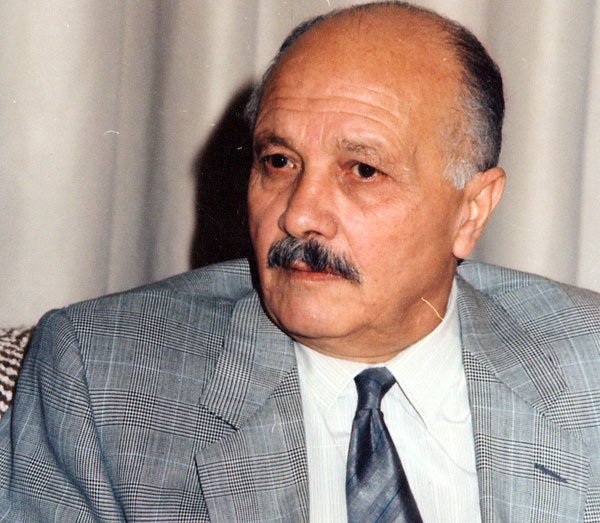Akef Al-Fayez Jordanian politician
About him
Akef Al-Fayez (1922 – April 8, 1998) was born in Amman. He held several ministerial positions and became the Speaker of the Jordanian House of Representatives for several sessions and a member of the Senate.
He held ministerial positions ten times, the first of which was in the government of Ibrahim Hashem formed on April 24, 1957, as Minister of Agriculture and Minister of Defense in an amendment to the government on October 22, 1957, then he held the position of Minister of Agriculture and Minister of Construction in the government of Samir Al-Rifai formed on May 18, 1958, then he held my position Minister of Agriculture and Social Affairs in the government of Hazza al-Majali formed on May 6, 1959, then became Minister of Defense in Bahjat al-Talhouni’s government formed on August 29, 1960, then held the positions of Minister of Public Works and Minister of Transportation in the government of Samir al-Rifai formed on March 27, 1963, then held the same two positions In the government of Sharif Hussein bin Nasser formed on April 21, 1963, then he held the positions of Minister of Transportation and Minister of Tourism and Antiquities in the government of Saad Juma formed on April 23, 1967, then he held the position of Minister of Transportation and Minister of State for Prime Minister Affairs in Bahjat Al-Talhouni’s government formed on October 7, 1967, Then he became Deputy Prime Minister and Minister of Interior in the government of Abdel Moneim Al-Rifai formed on March 24, 1969, then became Vice President and Minister of Cabinet Affairs in an amendment to the government on June 30, 1969, then returned to occupy the position of Minister of State He was responsible for the affairs of the cabinet in the Abdel Moneim government formed on June 27, 1970.
Many paradoxes distinguished Akef Al-Fayez from his peers at that stage. He was not born in the desert, where his clan’s bats extended within sight. Rather, he was born in Amman, which was preparing to storm the future through the gate of its choice as the capital of the emirate. He studied in its schools and was destined for him more than once to meet The Founding Prince, and to go in the early forties to study at the University of Aley in Lebanon, and get acquainted with a number of symbols of the nationalist trend to which Akef al-Fayez belonged. Political party .
Akef Al-Fayez was born in 1924, and some papers indicate that his birth was in 1920, and in 1945 he took over the position of the Farmers Syndicate, to be his gateway to political work, to receive in 1946 the position of Chief of Royal Protocols, to run in the first Parliament elections in 1947 and reserve his seat at the beginning of the twenties of his age.
Since his entry into the first House of Representatives in 1947 until the issuance of the decision to dissolve the tenth House of Representatives in 1988, Akef Al-Fayez reserved his seat in eight parliaments until he became one of the pillars of the legislative authority in the country, in which he led the House of Representatives for ten sessions, which is a record period, if compared to other politicians.
When Parliament was dissolved after the Rabat Summit Conference in 1974, Akef Al-Fayez was chosen as a member of the Senate, to reserve his seat in the House for five sessions, which ended with his resignation from the 16th Senate in 1991.
If President Ibrahim Hashem chose him for the first time as Minister of Agriculture in his fifth government, which he formed in 1957, after the political turmoil caused by the dismissal of the government of President Suleiman al-Nabulsi, the doors of subsequent governments remained open to this impulsive Bedouin youth, as he often married between the prosecution And the ministry.
Akef Al-Fayez held multiple ministerial positions in ten governments formed by seven presidents. He resigned from three governments before their term expired, namely the first Bahjat Al-Talhouni, the first Sharif Hussein bin Nasser, and the fourth Bahjat Al-Talhouni, while the ministerial portfolios he received were divided between agriculture, defense, interior, transportation and construction. Construction, Social Affairs, Labor, Prime Minister Affairs, Public Works, Tourism and Antiquities, while President Abdel Moneim Al-Rifai assigned him the position of Vice President in his first government.
Government documents indicate that the fifth cabinet of President Ibrahim Hashem, in which Akef al-Fayez held three ministerial portfolios, namely agriculture, construction and reconstruction, and defense, is the government that imposed martial law in 1957 and signed the Arab Union with Iraq in February 1958, while the sixth government of President Samir al-Rifai that received In which Al-Fayez was the portfolio of public works and transportation on the confidence of Parliament, and the aggression of June 1967 took place during the government of President Saad Jumaa, the first in which Al-Fayez received the portfolio of transportation, tourism and antiquities, at a time when he was holding the portfolio of agriculture and social affairs in the government of Prime Minister Hazza Al-Majali when he was assassinated in 1960.
The last ministerial position occupied by Akef Al-Fayez was in the second government of President Abdel Moneim Al-Rifai, during the days of escalating tension between the government and the guerrilla organizations in 1970, the government that preceded the formation of the military government. Once .
After the abolition of martial law and the return of party life to the country after the elections for the eleventh parliament, Akef Al-Fayez and a group of his friends and colleagues founded a party they called “Al-Watan”, taking advantage of the prevailing climate of political detente. By merging together in the summer of 1997, the National Constitutional Party was formed, but Akef al-Fayez was not able to live long to practice a party life that differs in its behavior from the many official jobs he held. He has won many high Jordanian, Arab and foreign decorations.

